You are using an out of date browser. It may not display this or other websites correctly.
You should upgrade or use an alternative browser.
You should upgrade or use an alternative browser.
East Palestine Ohio Train Crash & Poison Gas Plume Megathread
- Thread starter Bassoe
- Start date
More options
Who Replied?Because, quite frankly, rail companies don't have much of a long term. Or at least it's little different than the short term. Expansion of the rails is very difficult. A thousand train derailments is likely cheaper (to them) than actually fixing rails. So why not continue in this manner? And then this happens, which is going to be very expensive, except the train companies already planned for this with lobbying. The train company needs to be completely responsible for cleaning this up, just like oil companies are (definitely some iffiness here on actual payment, but you get the idea) for spills.All that matters to the US rail companies is quarterly earnings, not the long term.
Triangle Shirtwaist isn't just about lack of regulation. It's also about inadequate punishment for violating the NAP. The wrongful death payouts were way too low: it ought to have beggared them. Then the problem would have been solved.Yeah, this is what deregulation and the free market lead directly to if the government doesn't keep a choke chain on its dog.
Regulation does not work, because businesses will buy off the politicians and infiltrate the regulators, as they did here. People look at regulation as a magic wand that just needs the right words and right magician to say them. But you'll almost never get the right words or right magician, the magician will be chosen by the people getting regulated, and the words will be chosen by the regulated company, after the news cycle changes.
Not to mention, that government regulation, even if it is done right, has invisible costs that add up to prevent good. Because every regulator is inclined to say no, as they can't get in trouble for a no, only a yes that leads to bad stuff. These invisible costs adding up is what cause the regulatory capture of companies, as they realize they must use the levers of government to get anything done, they need to control them. The idea that yanking on the leash won't cause the dog to bite back is absurd.
The government's job ought to be coming in after things have gone to shit, and fucking up the company(s) responsible completely. That's it. Trying to predict every possible problem ahead of time, and then trying to prevent them all, is what leads to corporate control of government or government control of corporations, both of are bad (cronyism or socialism), and usually ends up with them working hand in hand, which is the worst.
Last edited:
Rail companies and their infrastructure double as national defense assets; they aren't going anywhere, no matter how badly run or managed they are.Because, quite frankly, rail companies don't have much of a long term. Or at least it's little different than the short term. Expansion of the rails is very difficult. A thousand train derailments is likely cheaper (to them) than actually fixing rails. So why not continue in this manner? And then this happens, which is going to be very expensive, except the train companies already planned for this with lobbying. The train company needs to be completely responsible for cleaning this up, just like oil companies are (definitely some iffiness here on actual payment, but you get the idea) for spills.
Best we can hope for is the situation gets bad enough the DoD bitch-slaps the rail companies for compromising national defense readiness with their shit, and forces them to fix things or get their company liquidated.
And how is that an excuse to insurance companies? Few big payouts like that with hazmat accidents and they would have a damn good reason.Because unlike aircraft and ships, trains are much more fixed to specific infrastructure, which is owned by a decreasing number of companies, and new rail lines can take decades to get approved, never mind built.
And that's before you get to the overworked, underpaid, and nearly wage-slave conditions some railroads operators in the US force on their employees.
If existing rail lines run like shit, no wonder new ones get easily stuck on red tape and have issues with funding.
Especially when they can and probably do jump on the green grifting for extra money.
Why can't they raise prices to fix both problems?
Competition perhaps?
That sounds like a classic lefty excuse. Especially with how rail company problems are pretty damn common all over the world, state, private or hybrid. You would struggle to find more than few countries where rail companies have well functioning hardware and satisfied workers, but finding countries where workers constantly threaten strikes and the hardware is shitty is absolutely easy.All that matters to the US rail companies is quarterly earnings, not the long term.
Look, I wish I had the answers for why US rail operations are such a clusterfuck, but the plain fact is the US rail system and mindset around rail transport is vastly different from Europe, and you guys tend to put more...effort and thought into long term rail longevity than we do.And how is that an excuse to insurance companies? Few big payouts like that with hazmat accidents and they would have a damn good reason.
If existing rail lines run like shit, no wonder new ones get easily stuck on red tape and have issues with funding.
Especially when they can and probably do jump on the green grifting for extra money.
Why can't they raise prices to fix both problems?
Competition perhaps?
That sounds like a classic lefty excuse. Especially with how rail company problems are pretty damn common all over the world, state, private or hybrid. You would struggle to find more than few countries where rail companies have well functioning hardware and satisfied workers, but finding countries where workers constantly threaten strikes and the hardware is shitty is absolutely easy.
Also, competition in rail is mostly dead in the US, and large parts of the US are under effective rail monopolies who can set prices and schedules without concern for competition in their core regions.
Bear Ribs
Well-known member
Insurance companies do not work the way most people on the ground imagine.And how is that an excuse to insurance companies? Few big payouts like that with hazmat accidents and they would have a damn good reason.
You might think insurance companies want to minimize how much they pay out in claims, f'rex. This jives with your average guy on the street who gets his claims denied for everything, so insurance companies must not like paying, right? In reality, though, it's just the opposite. Because of how the laws work, an insurance company can only collect premiums equal to a small percentage over the cost of all claims, so if they want to maximize profits, they also have to make huge payouts in claims in order to boost the value of that small percentage.
In practice, this means insurance companies love to pay out massive claims to their biggest and most important clients, well in excess of premiums* in order to raise the total claims paid out. Then they can profit by denying everything they can with their small-time customers wanting insurance on their beat-up 20-year-old car while also jacking premiums up to heaven for said rando on the street to subsidize the big companies. Hospitals and medical insurance work on exactly the same principle, which is how we wind up with aspirin costing seven hundred dollars a pill.
*The probability of kickbacks both ways as well as to politicians who regulate this sort of thing, of course, is yes.
Oh do we?Look, I wish I had the answers for why US rail operations are such a clusterfuck, but the plain fact is the US rail system and mindset around rail transport is vastly different from Europe, and you guys tend to put more...effort and thought into long term rail longevity than we do.
As i said...
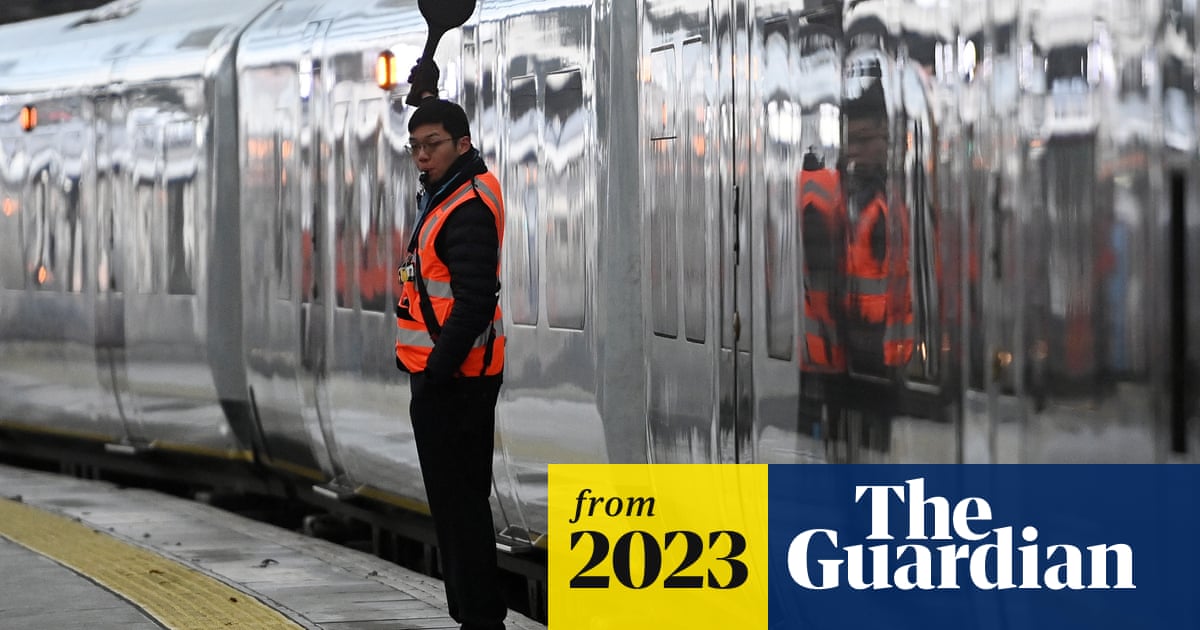
Failure to invest has left Britain’s railways in a mess | Letters
Letters: Delays and cancellations are the result of a failure to modernise rail infrastructure, writes Derek Buttivant. Plus Rob Dark on the £8.3bn lost to dividend payments

Poor infrastructure stops France from exploiting alternatives to fuel-guzzling cars, trucks
Although 90% of all goods in France are transported by road compared to the EU average of 75%, more eco-friendly alternatives, like rail and river transport, cannot fully be exploited due to the poor infrastructure currently in place.

Why are Europe’s railways a mess? Our public diagnosis of the problem falls short | EU | Before It's News
Another day, another earnest column in a broadsheet newspaper listing the problems with Europe’s railways – this time it’s Die Zeit. We should fly less, we need more high speed trains, we need more night trains, plans for more have come to nothing, why is infra investment in Germany so slow,...
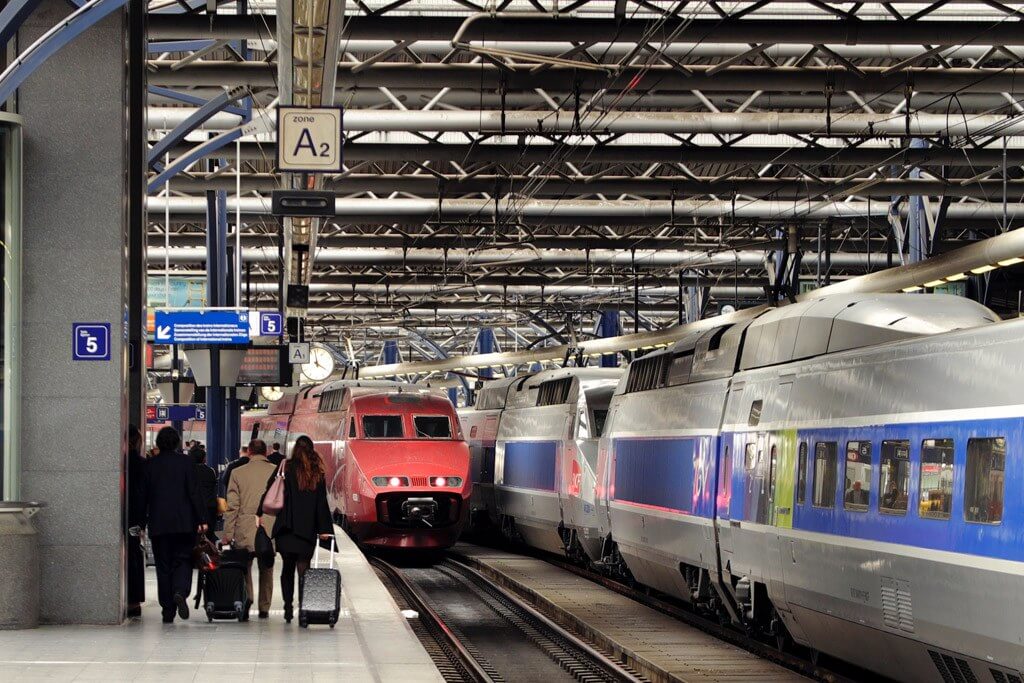
SNCF Strike & France Train Strike Dates 2024: Info and Best Tips to Survive | France Bucket List
All about train strikes in France February 2024 and top tips: SNCF strike February 2024, TGV strike February, and other French train strike dates
 travelfrancebucketlist.com
travelfrancebucketlist.com
Most major EU countries have one or both problems too.
It sure seems like it; I think it's because the average Euro uses trains a lot more than the average person in the US.Oh do we?
As i said...

Failure to invest has left Britain’s railways in a mess | Letters
Letters: Delays and cancellations are the result of a failure to modernise rail infrastructure, writes Derek Buttivant. Plus Rob Dark on the £8.3bn lost to dividend paymentswww.theguardian.com

Poor infrastructure stops France from exploiting alternatives to fuel-guzzling cars, trucks
Although 90% of all goods in France are transported by road compared to the EU average of 75%, more eco-friendly alternatives, like rail and river transport, cannot fully be exploited due to the poor infrastructure currently in place.www.euractiv.com

Why are Europe’s railways a mess? Our public diagnosis of the problem falls short | EU | Before It's News
Another day, another earnest column in a broadsheet newspaper listing the problems with Europe’s railways – this time it’s Die Zeit. We should fly less, we need more high speed trains, we need more night trains, plans for more have come to nothing, why is infra investment in Germany so slow,...beforeitsnews.com

SNCF Strike & France Train Strike Dates 2024: Info and Best Tips to Survive | France Bucket List
All about train strikes in France February 2024 and top tips: SNCF strike February 2024, TGV strike February, and other French train strike datestravelfrancebucketlist.com
Most major EU countries have one or both problems too.
Sure problems exist, however alternative routes and companies exist as well in quantity in Europe; not some much in the US. Here we have Amtrak and freight rail, and that's about it, and the freight rail is nearly monopolized as is.
Rail is far more important for freight than passenger transport in sheer scale (and that's with massive shilling by the greens), which is usually done by separate lines anyway because no one wants to spend hours in a train lagging behind some super slow bulk cargo train.It sure seems like it; I think it's because the average Euro uses trains a lot more than the average person in the US.
Again, you are idealizing the grass on the other side of the fence.Sure problems exist, however alternative routes and companies exist as well in quantity in Europe; not some much in the US. Here we have Amtrak and freight rail, and that's about it, and the freight rail is nearly monopolized as is.
Some of the mentions have outright state near-monopolies, like France.
And that's ignoring the elephant in the room, namely that rail works best for connecting high density settlements at medium distances, and that's a description only few very specific parts of USA fit, and on top of that some of them have an additional showstopper, namely... political law and order problems that make public transport unpleasant at best and dangerous at worst, which is something that Japan, probably the most famous country when it comes to widespread use of passenger rail, is a counter-example of.
Last edited:
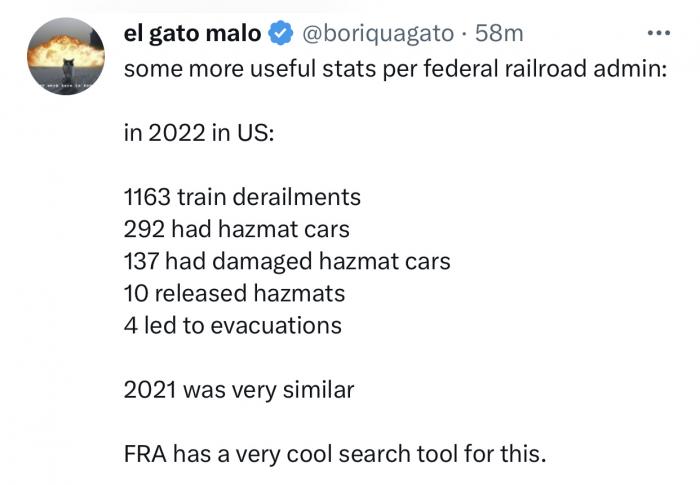
Many blame the precision scheduled railroading along with cutting costs in maintenance, for such state of matters in a first world nation. Basically, the personnel numbers are cut to minimum or bellow it (it looks great in quarterly report to shareholders), maintenance is often outsourced to a lowest bid contractor (it looks great in quarterly report to shareholders), while tight schedules leave a little slack for any inconvenience.
when your defense after an accident is I was shit at my job for years....that isn't a good defense.
Karmic Acumen
Well-known member
Well isn't this just perfect.
Why do people have such a hard time accepting the existence of objective evil again?
Well isn't this just perfect.
Why do people have such a hard time accepting the existence of objective evil again?
Because once you accept it your left with what are you going to do about it?
Because once it gets bad enough your going to have to go into some very dark places to make it stop.
The entire rail ecosystem is thoroughly fucked up.
The US rail system is primarily used for commercial transport, and is essentially already at capacity. Any rail line being shut down for any substantial period of time doesn't just cost tons of money, it also has a ripple effect that can impact the entire economy.
Large scale replacement and upgrades of the rail infrastructure (which is very much needed) inherently means closing those rail lines to traffic for a substantial period of time. And unlike the US road network, detouring around the under construction part of the rails is effectively impossible.
Then you have the capital costs. Rail lines are expensive. The workforce doesn't currently exist for large scale rail construction in the US at the moment. Nor does the infrastructure to build all of the rail at the needed scale in a reasonable time period at a reasonable cost.
Then you have the regulatory environment. Short of the federal government passing laws that explicitly override state and local regulatory and approval processes and streamline the federal process, you are looking at years of regulatory obstacles before you could even start doing any kind of large scale, substantive, upgrades to the rail network. And note that this assumes that you don't need any new land or right of ways.
Then you have the next big issue. Upgrading the trains themselves. Not the engines, but all of the cars. That is another massive infrastructure project to build the facilities to make the needed number of train cars in a reasonable time period.
---
In terms of lawsuits, those have their own issues. In this case, who ordered the burn? Legal responsibility for that decision isn't on the rail company, it's on whatever government authorities decided to order it. That won't let them wholesale avoid liability, but it will let them avoid a good chunk of it (I'm not conversant enough in the relevant legalities to be any more specific than that).
Then you have the liability for the accident itself. That, to a large extent, depends on what specifically caused the derailment. An issue with the tracks means the rail owners as opposed to the train owners are more liable. Except if the government inspectors/certifiers had certified that the rails met or exceeded all relevant legal standards then it gets a lot harder to make liability stick to the corporation; at the very least, negligence gets a hell of a lot harder to prove.
But lets say that you get a class action lawsuit (which you should) and that a settlement is refused and that a jury finds the company liable. Realistically speaking, the damages in this case will exceed their ability to pay. Insurance policies have a cap on how much they will cover, and that will easily be exceeded. Assuming a badly structured corporation so that a lawsuit can actually get at the underlying corporate assets/wealth, you will get a bankruptcy. The assets will be bought at relatively distressed prices and life will go on. The lawyers will pocket a lot of money, the government will get a lot more of it in fines/their own lawsuits, and whatever is left will end up shared out amongst everyone with a claim (which is potentially a substantial chunk of the US population).
----
If you really want to fix US infrastructure, any of it, then you need to get Congress to act. And not just in appropriating money, but in actively interfering in state and local regulatory regimes.
The very first step? Establish a federal permitting and environmental impact assessment process that explicitly overrides and bars any state or local interference and explicitly bars the federal government from revoking an issued permit without first going through a long and difficult process. Oh, and explicitly puts a time limit on how long the federal government has to render a decision with a failure to meet that deadline automatically granting approval.
Because right now? Any kind of infrastructure project is going to require local approval, state approval, and federal approval. And anything that crosses jurisdictions? You need approval from every involved jurisdiction, each with their own idiosyncratic process and their own time scale.
As a general rule, any kind of infrastructure project will spend longer in the regulatory approval process then it will take to construct. And that's without accounting for the expected lawsuits.
The US rail system is primarily used for commercial transport, and is essentially already at capacity. Any rail line being shut down for any substantial period of time doesn't just cost tons of money, it also has a ripple effect that can impact the entire economy.
Large scale replacement and upgrades of the rail infrastructure (which is very much needed) inherently means closing those rail lines to traffic for a substantial period of time. And unlike the US road network, detouring around the under construction part of the rails is effectively impossible.
Then you have the capital costs. Rail lines are expensive. The workforce doesn't currently exist for large scale rail construction in the US at the moment. Nor does the infrastructure to build all of the rail at the needed scale in a reasonable time period at a reasonable cost.
Then you have the regulatory environment. Short of the federal government passing laws that explicitly override state and local regulatory and approval processes and streamline the federal process, you are looking at years of regulatory obstacles before you could even start doing any kind of large scale, substantive, upgrades to the rail network. And note that this assumes that you don't need any new land or right of ways.
Then you have the next big issue. Upgrading the trains themselves. Not the engines, but all of the cars. That is another massive infrastructure project to build the facilities to make the needed number of train cars in a reasonable time period.
---
In terms of lawsuits, those have their own issues. In this case, who ordered the burn? Legal responsibility for that decision isn't on the rail company, it's on whatever government authorities decided to order it. That won't let them wholesale avoid liability, but it will let them avoid a good chunk of it (I'm not conversant enough in the relevant legalities to be any more specific than that).
Then you have the liability for the accident itself. That, to a large extent, depends on what specifically caused the derailment. An issue with the tracks means the rail owners as opposed to the train owners are more liable. Except if the government inspectors/certifiers had certified that the rails met or exceeded all relevant legal standards then it gets a lot harder to make liability stick to the corporation; at the very least, negligence gets a hell of a lot harder to prove.
But lets say that you get a class action lawsuit (which you should) and that a settlement is refused and that a jury finds the company liable. Realistically speaking, the damages in this case will exceed their ability to pay. Insurance policies have a cap on how much they will cover, and that will easily be exceeded. Assuming a badly structured corporation so that a lawsuit can actually get at the underlying corporate assets/wealth, you will get a bankruptcy. The assets will be bought at relatively distressed prices and life will go on. The lawyers will pocket a lot of money, the government will get a lot more of it in fines/their own lawsuits, and whatever is left will end up shared out amongst everyone with a claim (which is potentially a substantial chunk of the US population).
----
If you really want to fix US infrastructure, any of it, then you need to get Congress to act. And not just in appropriating money, but in actively interfering in state and local regulatory regimes.
The very first step? Establish a federal permitting and environmental impact assessment process that explicitly overrides and bars any state or local interference and explicitly bars the federal government from revoking an issued permit without first going through a long and difficult process. Oh, and explicitly puts a time limit on how long the federal government has to render a decision with a failure to meet that deadline automatically granting approval.
Because right now? Any kind of infrastructure project is going to require local approval, state approval, and federal approval. And anything that crosses jurisdictions? You need approval from every involved jurisdiction, each with their own idiosyncratic process and their own time scale.
As a general rule, any kind of infrastructure project will spend longer in the regulatory approval process then it will take to construct. And that's without accounting for the expected lawsuits.
Scooby Doo
Well-known member
They aren't defense assets. They are useful, yes. But just calling infrastructure a defense asset is a bad idea that leads to future problems, and screams of a lead up to nationalization to me.Rail companies and their infrastructure double as national defense assets; they aren't going anywhere, no matter how badly run or managed they are.
Best we can hope for is the situation gets bad enough the DoD bitch-slaps the rail companies for compromising national defense readiness with their shit, and forces them to fix things or get their company liquidated.
As for who is liable, IMO even if it was a genuine accident despite using the best of safety equipment, the railcar ought to be presumptively liable (though if you want to say the owner of the chemicals or the rail road owner, that's fine by me). This ensures that the moral hazard is always there, unless they can prove a different person caused the problem (i.e. a terrorist or another company). This preserves moral hazard and ensures that unavoidable risks are accounted for on balance sheets.
DarthOne
☦️
Alleged image from the Ohio area; seems that Norfolk Southern is going for the Pfizer method. You cannot interact with them unless you first sign away your rights and hold them blameless.
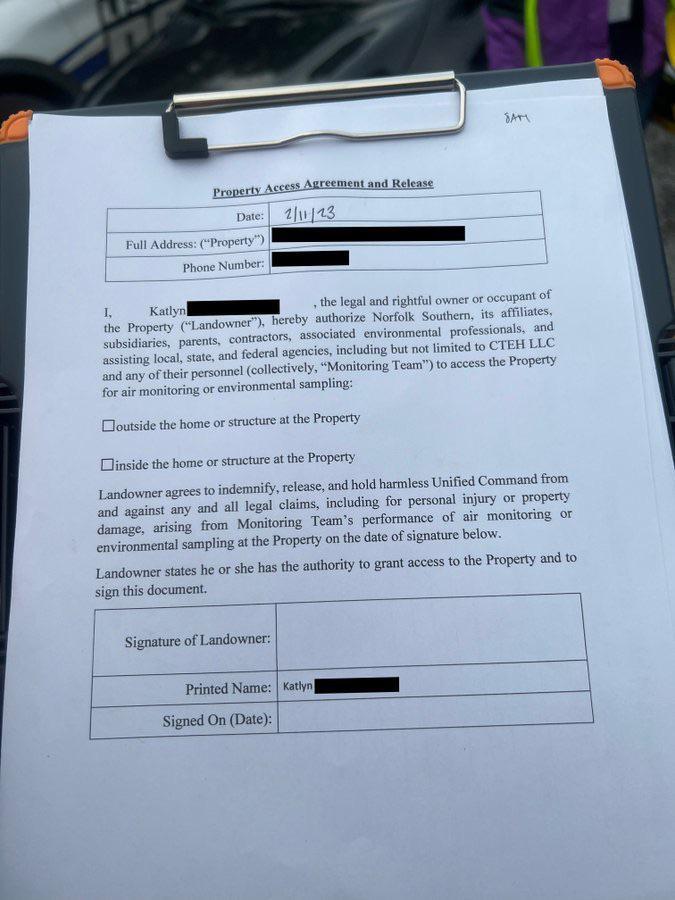
Infuriating Ohio Train Update: Officials Buried Critical Health Risks Until After Residents Returned

 flagandcross.com
flagandcross.com
Biden Admin Rejects Ohio's Request For Disaster Aid After Toxic Train Derailment
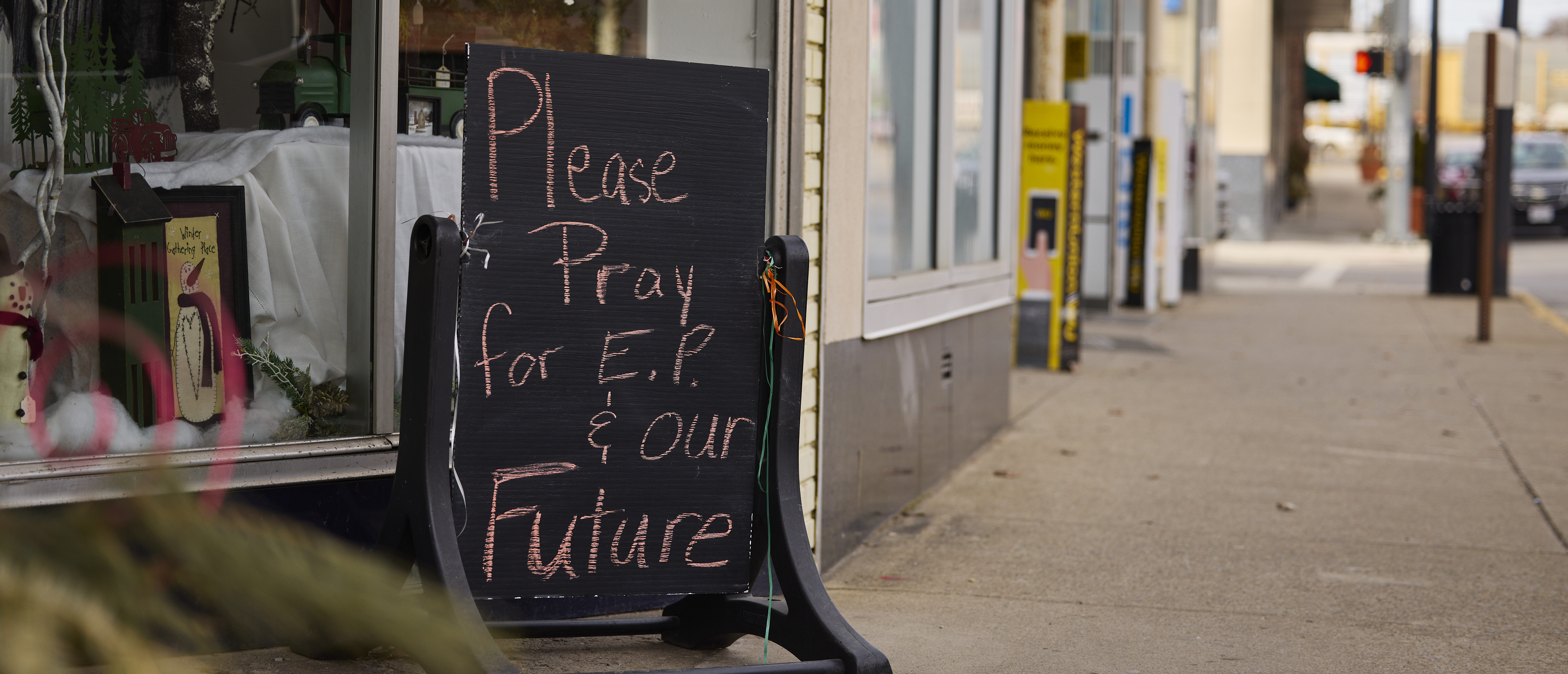
 dailycaller.com
dailycaller.com

Infuriating Ohio Train Update: Officials Buried Critical Health Risks Until After Residents Returned

Infuriating Ohio Train Update: Officials Buried Critical Health Risks Until After Residents Returned
The train that derailed in Ohio was carrying even more hazardous chemicals than authorities initially realized.
 flagandcross.com
flagandcross.com
The derailment of a train carrying hazardous chemicals in Ohio may be even more dangerous than the public has been told.
State officials initially focused on the release of vinyl chloride after 50 cars of a Norfolk Southern Railroad train derailed in East Palestine, Ohio, on Feb. 3, according to ABC News.
Phosgene and hydrogen chloride were also released from the train derailment, hazardous substances that led authorities to order evacuations within one mile of the crash site.
Authorities arranged for the blasting of some affected train cars — a tactic to allow for a controlled burn of the substances.
These weren't the only chemicals that were released in the smoking blaze that followed the accident.
A train manifest created by Norfolk Southern Railroad shows cargo containing more hazardous chemicals.
Ethylhexyl acrylate, isobutylene and ethylene glycol monobutyl ether were also released in the accident, according to the manifest acquired by ABC News.
Completing this poll entitles you to our news updates free of charge. You may opt out at anytime. You also agree to our Privacy Policy and Terms of Use.
These three substances can cause adverse health effects.
Ethylhexyl acrylate is known to cause eye and skin burning, isobutylene can cause dizziness and drowsiness, and ethylene glycol monobutyl can induce nervous system depression, headaches and vomiting, according to Centers for Disease Control data reviewed by ABC.
The train's load of the additional chemicals is being made known after evacuation orders for East Palestine residents and some Pennsylvanians were rescinded last week, according to the New York Post.
Authorities rescinded the evacuation orders after testing air and soil samples for contamination.
Aerial footage of the aftermath of the accident depicts a scene wrought with destruction.
The Environmental Protection Agency said it couldn't detect dangerous levels of toxins in the air on Monday, according to ABC.
EPA's top priority is the health and safety of all communities. Since the initial train derailment in East Palestine, Ohio, we have had 6 staff and 16 contractors on the ground to assist with air monitoring actions.
EPA Great Lakes
@EPAGreatLakes
EPA's top priority is the health and safety of all communities. Since the initial train derailment in East Palestine, Ohio, we have had 6 staff and 16 contractors on the ground to assist with air monitoring actions.
7:16 PM · Feb 13, 2023·
We are conducting indoor and outdoor air monitoring to test for volatile organic compounds (including vinyl chloride) and other chemicals of concern. Our air monitoring uses a science-based approach and we will continue to consult with local authorities as more info is collected.
As of February 12, we have screened 291 homes and no detections of vinyl chloride or hydrogen chloride were identified. There are 181 remaining homes to screen. At this time, EPA has not detected any levels of concern in the community that can be attributed to the incident.
We are working closely with @OhioEPA to determine what impact the spill has had on surface and ground water. @ORSANCOchannel and other agencies are sampling the Ohio River at strategic locations to ensure drinking water intakes aren't affected.
On February 10, we issued a general notice of potential liability letter to Norfolk Southern to document the release of hazardous contaminants. The letter outlines EPA cleanup actions at the site and the potential to hold the railroad accountable for associated costs.
We continue to assist with screening efforts for residents who request to have their homes tested for chemicals from the fire. To request screening, call 330-849-3919.
For more information, visit http://response.epa.gov/EastPalestineTrainDerailment…
The federal agency assessed 291 homes for potential exposure to vinyl chloride and hydrogen chloride.
This article appeared originally on The Western Journal.
Biden Admin Rejects Ohio's Request For Disaster Aid After Toxic Train Derailment

Biden Admin Rejects Ohio’s Request For Disaster Aid After Toxic Train Derailment
The Biden Administration turned down Republican Ohio Gov. Mike DeWine's request for federal disaster assistance after a train derailment in East Palestine.
The Biden administration turned down Republican Ohio Gov. Mike DeWine's request for federal disaster assistance after a train derailment in East Palestine caused several hazardous chemicals to be released into the air and water ways, Dan Tierney, DeWine's press secretary, told the Daily Caller News Foundation.
The Federal Emergency Management Agency (FEMA) said that Ohio is not eligible to receive assistance because the incident did not classify as a national disaster, Tierney told the DCNF. The rejection came nearly two weeks after a Norfolk Southern train, which carried harmful chemicals, derailed and nearly 2,000 residents were evacuated before a controlled release of the fumes cast a large plum over the town. (RELATED: 'Do We Stay?': Ohioans Seek Answers After Massive Train Derailment Casts Toxic Plume Over Their Town)
FEMA classifies a national disaster declaration as when there is property damage caused by a tornado, flood, hurricane or earthquake, Tierney explained. The state currently does not have associated costs it could "demonstrate to FEMA to be able to get a disaster declaration" since the derailed train cars did not cause any power outages, block any roads or impede resident's property.
"FEMA is in constant contact with the emergency operations center in East Palestine and with the Ohio Emergency Management Agency," Jeremy Edwards, FEMA press secretary, told the DCNF. "We are closely coordinating with EPA, HHS, and the CDC, who are helping to test water and air quality, and to conduct public health assessments."
Norfolk Southern is paying for expenses related to the derailment including hotel costs for residents who were temporarily displaced, Tierney told the DCNF. Ohio is ineligible for FEMA relief unless it can prove the town suffered property damage that is not reimbursable.
"Certainly if FEMA tells us there is a program we can apply for, that we're eligible for, we will, but there is nothing that we are eligible for or that we're aware that Ohio is eligible for that we can apply for at FEMA," Tierney said.
He said that the state received aid from the Department of Health and Human Services, Environmental Protection Agency and the Pentagon.
The EPA tested 396 homes and had scheduled to screen 64 more as of Tuesday and reported no detection of vinyl chloride or hydrogen chloride, regional administrator Debra Shore said in a statement.
Residents, however, remain concerned about the long-term effects the disaster could have on their health. They are being advised by the Ohio Department of Health to drink from bottled water until private wells are tested, according to a Wednesday water quality update from DeWine's office.
Residents vocalized their concerns during a public hearing Wednesday at a local high school. While Norfolk Southern representatives were supposed to attend, they pulled out at the last minute because of safety concerns.
"I'm just as frustrated. I live in the community, just like you," Trent Conaway, East Palestine mayor, reportedly told the crowd. "I'm trying to get answers."
HHS, the EPA, the Pentagon and Conaway did not immediately respond to the DCNF's request for comment. Norfolk Southern could not be reached.
Nick Sortor
@nicksortor
·
Feb 15
The people of East Palestine are PISSED OFF.
The mayor is holding a town hall at East Palestine High School, and the people are DETERMINED to hold the government accountable!
I'll be live tweeting the town hall, so stay tuned!
First question: "why are the people outside of a one mile radius from East Palestine getting NO support?"
Answer: "Because that's what the Department of Transportation told us to do"
Unbelievable.
There are THOUSANDS of people from East Palestine at this town hall.
They're demanding answers, as they don't believe ANYTHING the government has told them thus far.
U.S. Congressman Bill Johnson: We have found nothing in the air or water that will be harmful.
East Palestine resident: "You all said the same thing about Ground Zero (9/11) too, and that was a lie!"
The resident's correct.
A little boy from East Palestine asks: "Why can't I play in the creeks and outside because of that smell?"
Ohio EPA answers: "It's just a mixture of dead fish and chemicals!"
The boy responds: "That's not fair!"
The government is ROBBING these kids of their childhoods!
Norfolk Southern, who caused the East Palestine disaster, decided not to send a SINGLE representative to talk to the people.
People are LIVID and are hellbent on REFUSING the company's $1,000 "hold harmless" bribes
jbalou
@joyca13
·
Feb 15
Replying to
@nicksortor
Claims for cancer deaths & a myriad of other illnesses diagnosed by the WTCHP are still being paid out 22 yrs after the World Trade Ctr attack. The people of Ohio deserve a same style commission to probe this disaster.
Last edited:
Look, I'm not sure anything short of nationalizing large amounts of the rail infrastructure, and putting it directly under the Corp Of Engineers ability to order work on at will, will unfuck the US rail network as is.They aren't defense assets. They are useful, yes. But just calling infrastructure a defense asset is a bad idea that leads to future problems, and screams of a lead up to nationalization to me.
As for who is liable, IMO even if it was a genuine accident despite using the best of safety equipment, the railcar ought to be presumptively liable (though if you want to say the owner of the chemicals or the rail road owner, that's fine by me). This ensures that the moral hazard is always there, unless they can prove a different person caused the problem (i.e. a terrorist or another company). This preserves moral hazard and ensures that unavoidable risks are accounted for on balance sheets.
It's just that bad now.
Yep! For such a critical part of your country's infrastructure, it's a goddamn decaying, decrepit mess.Look, I'm not sure anything short of nationalizing large amounts of the rail infrastructure, and putting it directly under the Corp Of Engineers ability to order work on at will, will unfuck the US rail network as is.
It's just that bad now.
However, it's just a symptom of a far greater problem: US infrastructure on the whole, and that includes banking systems, is at least thirty, forty years behind everyone else. It's all decaying and obsolete.
DarthOne
☦️
The price of being an Empire that cares more about foreign nations and peoples instead of its own. Well that and having a political class that is badly out of touch with reality.Yep! For such a critical part of your country's infrastructure, it's a goddamn decaying, decrepit mess.
However, it's just a symptom of a far greater problem: US infrastructure on the whole, and that includes banking systems, is at least thirty, forty years behind everyone else. It's all decaying and obsolete.
Users who are viewing this thread
Total: 2 (members: 0, guests: 2)
